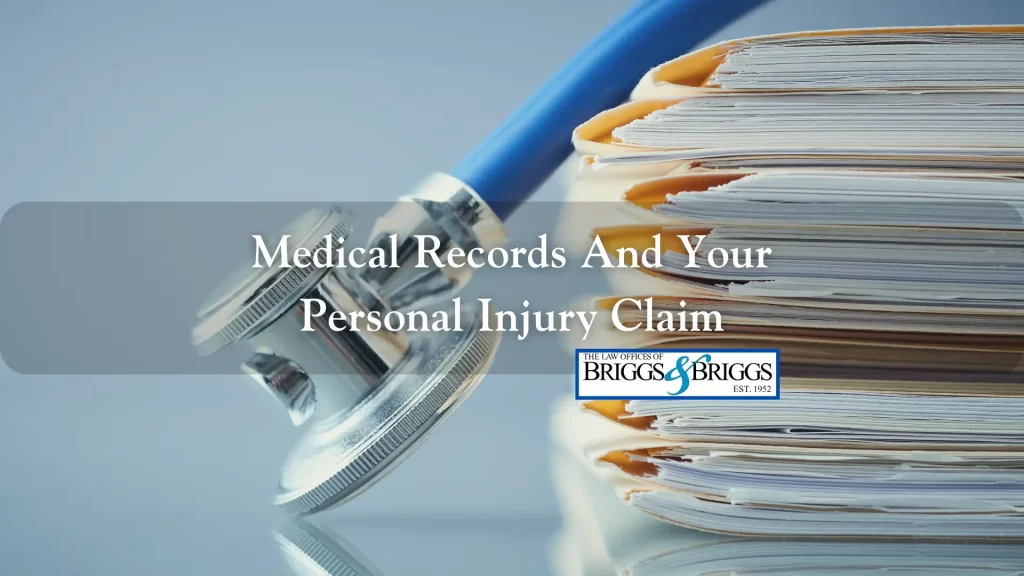Posted on Sunday, June 25th, 2023 at 4:38 pm

Call us if you suffered an injury in an accident or another harmful incident. You need to file a personal injury claim to seek compensation for your medical bills, lost income, and other losses. An essential component of your case will be your medical records. These documents play a pivotal role in demonstrating the extent of your injuries and validating your claim. You should know how these records will affect your injury claim, what documentation you need to support your case, and how a personal injury lawyer could help.
How Do Medical Records Affect an Injury Claim?
Medical records can significantly impact your personal injury claim in various ways. In particular, medical records can:
- Prove your injury – Medical records prove that you sustained injuries due to the incident. These documents substantiate your claim and are crucial evidence when negotiating with insurers.
- Determine your injury’s severity – Your medical records outline the severity of your injuries, which is essential because the more severe your injuries, the higher compensation you may receive.
- Establish causality – Your medical records link your injuries directly to the incident that harmed you. Establishing causality is crucial to validate your claim and show that you suffered losses.
- Support your compensation claim – Medical records back your claim for medical expenses, including past, present, and future. Furthermore, they can support claims for pain and suffering or loss of enjoyment of life.
What Medical Documentation Do I Need to Prove My Case?
Certain documents are indispensable in a personal injury claim to substantiate your case. Documentation that can help prove your claim includes:
- Initial medical reports – These are the first reports made by medical professionals after your injury. They could be from emergency responders, doctors, or hospital staff.
- Treatment details – This includes all procedures, medications, and therapies prescribed for your injury, along with the dates of these treatments.
- Diagnostic tests – Copies of x-rays, MRIs, CT scans, and other diagnostic tests prove the nature and extent of your injuries.
- Medical bills – Hospital bills, invoices, and other receipts justify your claim for medical expenses.
- Doctor’s notes – Notes from your doctors describing your injuries, their impact on your daily life, and your prognosis for recovery can be beneficial.
What Compensation Can I Recover in a Personal Injury Claim?
Compensation in a personal injury claim, also known as damages, can cover many losses. You may be able to recover:
- Medical expenses – This includes costs for hospital stays, surgeries, medications, therapy, and any future medical expenses related to your injury
- Lost wages – Compensation for the wages you’ve lost if you cannot work while healing from injuries
- Pain and suffering – The physical and emotional distress caused by your injury
- Loss of enjoyment of life – If your injuries prevent you from enjoying day-to-day activities or hobbies you once loved
- Future earnings – Compensation for future lost earnings if your injury is severe enough to limit your capacity to work in the future
How Can a Personal Injury Lawyer Help My Claim?
 A skilled personal injury lawyer can be indispensable in navigating the often complex process of a personal injury claim. A personal injury attorney in Washington State could help you by:
A skilled personal injury lawyer can be indispensable in navigating the often complex process of a personal injury claim. A personal injury attorney in Washington State could help you by:
- Offering sound legal advice – Lawyers can advise you on handling your claim and your legal rights. They can also explain complex legal terminology and procedures to you.
- Preparing your case – Your lawyer can gather and organize your medical records and other necessary evidence for your case.
- Calculating your losses – Determining the amount of compensation you are owed can be complicated. A lawyer can help calculate this figure, considering medical costs, lost wages, pain and suffering, and other factors.
- Negotiating with insurance companies – Insurance companies often try to minimize the amount they pay out. Your lawyer can handle negotiations on your behalf to help you pursue the compensation you deserve.
- Representing you in court – If your claim can’t be settled and goes to trial, your personal injury lawyer can represent you and fight for maximum compensation for your injuries and other losses.
Contact Our Personal Injury Lawyers in Washington State Today
Ensuring that your medical records accurately reflect your injury and its impact on your life is critical. A dedicated personal injury lawyer from The Law Offices of Briggs & Briggs can guide you through the process, helping you understand what documentation is necessary and how to present it effectively. Since 1952, The Law Offices of Briggs & Briggs has represented injury victims in the community and helped them seek the compensation they deserve.
Don’t wait – call us today at (253) 588-6696 or contact us online for a free consultation with our personal injury lawyers in Washington State.
Related Posts
When Can I Expect To Get My Settlement?
Why Would An Insurance Claim Be Denied After A Car Accident?
